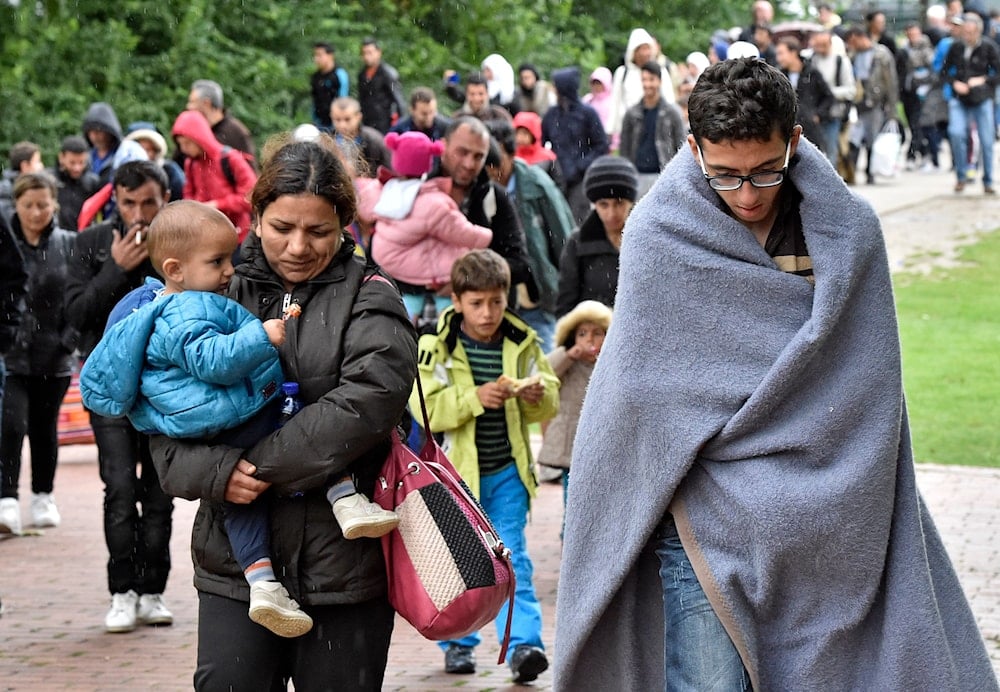Attacks on refugees rise in Germany amid surge of far-right crimes
Berlin reports a sharp rise in attacks on refugees and shelters in 2024, amid a rise in far-right crimes.
-

Migrants walk from the main station in Dortmund, Germany, to a hall where they get their first attendance on September 6, 2015. Thousands of migrants and refugees arrived in Dortmund by train. (AP Photo/Martin Meissner)
Berlin reported on Monday a significant increase in attacks on refugees in Germany, with both asylum seekers and refugee shelters targeted amid a broader rise in far-right crime and the tightening of German migration policy.
Official figures, provided at the request of two Green Party lawmakers, reveal that in 2024, 77 assaults on asylum seekers and refugees took place in Berlin, along with eight cases of deliberate damage to refugee residences.
This marks a steep rise from 2023, when there were 32 assaults on individuals and no reported attacks on shelters, according to lawmaker Ario Ebrahimpour Mirzaie.
As a result of the assaults, 34 people required hospital treatment, including 16 women, 14 men, two girls, and two individuals whose ages were not specified. Authorities identified 37 suspects in these direct assaults, 11 of whom were already known to police. No solid leads have been found regarding the attacks on refugee shelters.
Far-right crime in Berlin linked to anti-migrant sentiment
Green Party Deputy Jian Omar described the report as an "alarm bell," calling for urgent measures to protect refugees.
“We demand a clear protection plan for refugees, a visible police presence at endangered residences, comprehensive prevention work, and above all, policies that clearly recognise rightwing violence and decisively fight it,” he stated.
According to reports, Berlin hosts approximately 35,000 registered refugees in official reception centers and dormitories, with another 10,000 in emergency shelters, including at former airports Tegel and Tempelhof, where living conditions have been criticized as overcrowded and substandard.
Despite security measures, violence persists. In March, seven rightwing extremists attempted to forcibly enter a refugee shelter in Stahnsdorf, southwest of Berlin. They assaulted a security guard, leaving him unconscious, while chanting far-right slogans, according to witnesses.
Clara Bünger, a federal lawmaker from the Linke party, stressed the urgency of government action. “The number of insults, threats, and attacks against refugees has been worryingly high for years. It is outrageous that these conditions are accepted with a shrug by many politicians and members of the public,” she said.
Germany’s migration policy hardens as rightwing extremism rises
The Interior Ministry reported 218 politically motivated assaults on refugee shelters in 2024, up from 167 in 2023. However, crimes against individual asylum seekers dropped to 1,905, down from 2,488 in 2023.
Federal statistics show a 17% rise in rightwing extremist crimes in 2024, with 33,963 offenses reported by the end of November, including 1,136 violent attacks. Official annual figures are expected next month.
The anti-immigration Alternative für Deutschland (AfD) party gained over 20% of the vote in February’s snap election, becoming the largest opposition force in parliament. This rise has been linked to public concerns over immigration and recent violent incidents involving asylum seekers.
Conservative leader Friedrich Merz, set to be sworn in as chancellor on May 6, campaigned on stricter border policies and reducing irregular immigration.
Though a coalition agreement with the Social Democrats softened some of his proposals, it includes tougher measures such as suspending family reunifications for many refugees, increased border controls, and plans for deportations to countries previously excluded, like Syria and Afghanistan.
Read next: Germany follows US in deporting pro-Palestine protesters

 3 Min Read
3 Min Read










